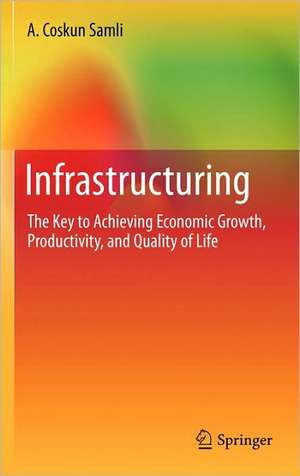Infrastructuring: The Key to Achieving Economic Growth, Productivity, and Quality of Life
Autor A. Coskun Samlien Limba Engleză Hardback – 2 dec 2010
| Toate formatele și edițiile | Preț | Express |
|---|---|---|
| Paperback (1) | 632.22 lei 6-8 săpt. | |
| Springer – 8 oct 2014 | 632.22 lei 6-8 săpt. | |
| Hardback (1) | 638.24 lei 6-8 săpt. | |
| Springer – 2 dec 2010 | 638.24 lei 6-8 săpt. |
Preț: 638.24 lei
Preț vechi: 750.88 lei
-15% Nou
Puncte Express: 957
Preț estimativ în valută:
122.14€ • 127.05$ • 100.84£
122.14€ • 127.05$ • 100.84£
Carte tipărită la comandă
Livrare economică 14-28 aprilie
Preluare comenzi: 021 569.72.76
Specificații
ISBN-13: 9781441975201
ISBN-10: 1441975209
Pagini: 128
Ilustrații: XVIII, 109 p.
Dimensiuni: 155 x 235 x 20 mm
Greutate: 0.36 kg
Ediția:2011
Editura: Springer
Colecția Springer
Locul publicării:New York, NY, United States
ISBN-10: 1441975209
Pagini: 128
Ilustrații: XVIII, 109 p.
Dimensiuni: 155 x 235 x 20 mm
Greutate: 0.36 kg
Ediția:2011
Editura: Springer
Colecția Springer
Locul publicării:New York, NY, United States
Public țintă
ResearchTextul de pe ultima copertă
The recent global financial crisis has intensified concerns over how nations—both developed and developing—can revitalize economic growth and ensure opportunity for prosperity to all citizens. Many analysts and policymakers alike are looking to new business creation and the promotion of entrepreneurial practices as a panacea, or at least as a partial solution. A. Coskun Samli has argued in his two most recent books that the current model of globalization tends to marginalize the poor and that developing countries must rely on local business development, rather than exogenous forces, such as aid, loans, and trade, to catalyze growth. This third book in his trilogy argues that a "bottom-up" approach is necessary for developing countries to participate in globalization—but is not sufficient. He proposes that the economic goals of a country, a region, or a company are fulfilled first and foremost by a properly designed and maintained infrastructure, encompassing both physical elements, such as transportation and communication systems, and qualitative elements, such as functioning educational, legal, and governing institutions. In Infrastructuring, Samli analyzes the experiences of a variety of countries, including China, India, Ireland, and South Africa, to highlight the role that infrastructure plays in economic development, and considers its implications for such timely issues as new business creation, productivity, and supply chain logistics. Moreover, he outlines practical approaches to infrastructure management and policy oversight.
Caracteristici
Focuses on the essential role that infrastructure plays in economic growth and business creation — for both developing and developed countries International coverage, with comparative analysis across countries and regions Offers practical and policymaking insights Includes supplementary material: sn.pub/extras











